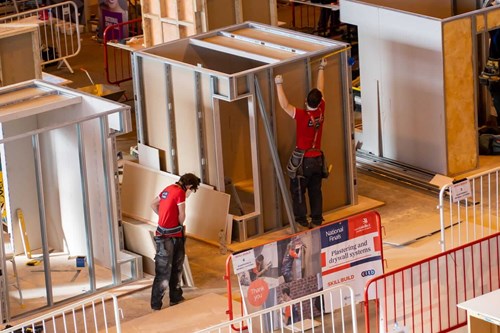Apprenticeships in England
Apply for apprenticeships in England
Dryliners create walls and rooms in buildings. They use plasterboard to hide pipes and wires, make space for insulation and smooth out uneven surfaces. They can build suspended ceilings, raised floors, and provide specialist soundproofing. The role involves measuring, cutting and attaching plasterboard (fixing), and sealing over joints between boards to smooth the edges (finishing).
£17000
-£30000
42-44
There are several routes to becoming a dryliner. You can start on your career path by studying on a college course or doing an apprenticeship.
You should explore the options to find out which is the right one for you. Although some of these options will list qualification requirements, many employers are more interested in people who are enthusiastic, willing to learn and able to follow instructions.
You may need a Construction Skills Certification Scheme (CSCS) card to work on a construction site.

You may have to attend a specialist college/training provider to train as a dryliner. You could study for a Level 1 Award in Dry Lining Operations or a Level 2 or 3 Diploma in Dry Lining.
Find out what the entry requirements are where you live.
If you are aged between 16 and 24 you may be eligible for a traineeship. This is a short course (2 weeks - 6 months) which helps you to gain work experience in your chosen role.
An apprenticeship with a construction firm is a good way into the industry.
Apprenticeships are open to anyone over the age of 16. As an apprentice, you will be fully employed by your company and expected to work a minimum of 30 hours a week. Your time will be split between on-the-job experience and a college or training provider.
An intermediate apprenticeship in drylining takes around 2 years to complete. Alternatively, you could initially follow a plastering apprenticeship route, and then specialise in drylining.
Find out what the entry requirements are where you live.
If you can find a job as a dryliner’s labourer, mate or assistant, your employer may help you to do further training on-the-job to gain more skills.
If you have on-site experience in woodworking, plastering or partitioning experience, you may be able to apply directly to an employer for a job.
Work experience is essential to gaining employment within the construction industry. You could gain this at school, or by working weekends and holidays with a company or relative who works in construction. Potential employers will always be pleased to see work experience listed on your CV.
Additional skills which may benefit anyone considering a job as a dryliner include:
To become a dryliner, you could complete a:
To become a dryliner, you could complete a:
To become a dryliner, you could complete a:
As a dryliner you will be responsible for creating walls using plasterboard.
The job role of a dryliner involves the following duties:
The expected salary for a dryliner varies as you become more experienced
Salaries depend on location, employer and any overtime you may do.
* Salaries have been collected from multiple industry sources
Check out the latest Dryliner vacancies:
As these are external websites, the number of job vacancies related to your preferred job role may vary. New opportunities will be posted as they come up.
You could progress to become a drylining quantity surveyor or an estimator. Alternatively, you could become a site supervisor or team leader and earn a higher salary.
It is possible for dryliners to specialise or move into a related trade. You could become a ceiling fixer, partitioning systems operative or plasterer.
You could set up your own business and work as a subcontractor for construction companies.
Explore the progression opportunities below